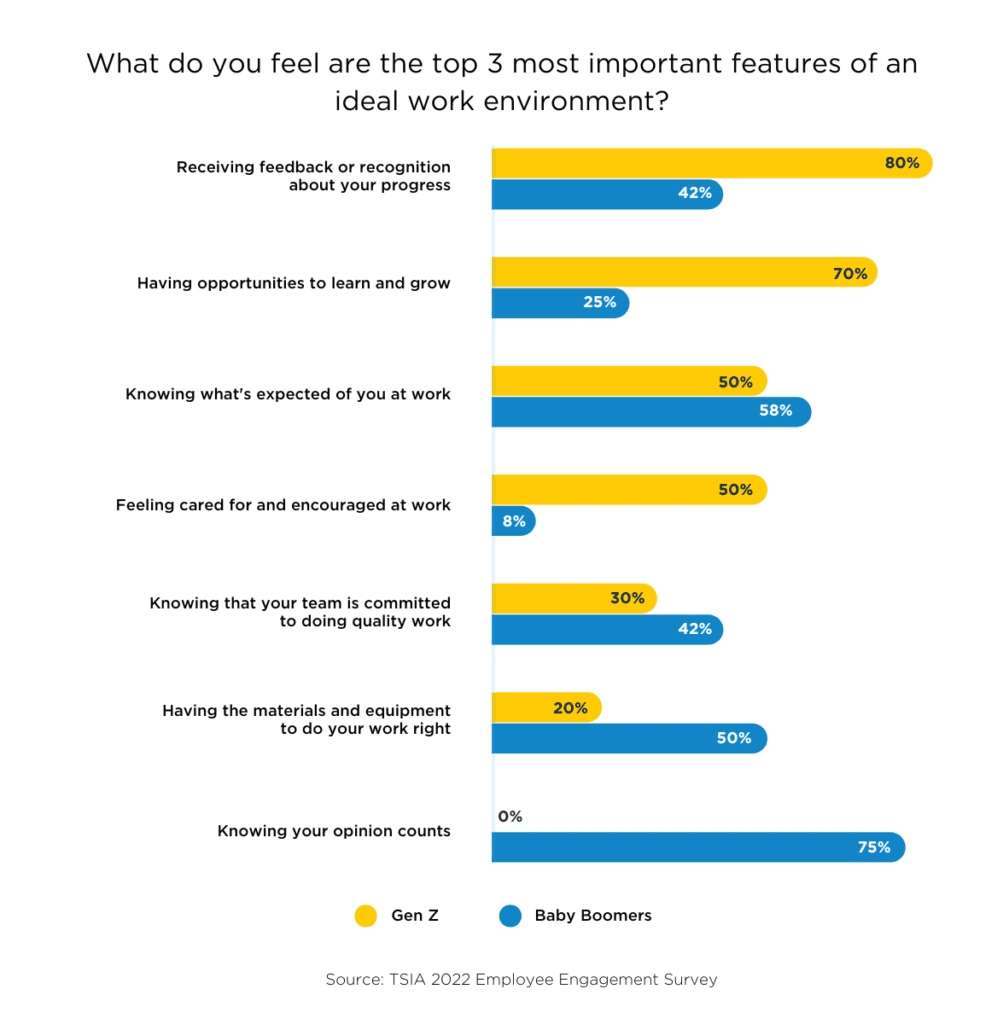Technology & Services Industry Association hosted a webinar sponsored by Tek Experts on January 26, 2023, about Building the Tech Workforce of Tomorrow: Where, Why and How. The session included talent experts from around the world discussing the talent challenges tech companies are facing today, as we’ve seen with the tech talent shortage, recent layoffs and hiring freezes, and how they can overcome these obstacles now while also preparing for the future.
Watch the webinar on demand now.
To develop a successful talent strategy that works for your organization long-term, it’s important to first understand what is causing the current talent shortage and how access to talent and technology skills will evolve in the future.
What’s causing the tech talent shortage?
A lot is happening in the world right now that is impacting the availability of technical talent and how organizations are shaping their tech talent strategies. Competition for talent remains fierce with businesses looking for new ways to attract and retain employees.
Let’s explore four key reasons why organizations are struggling with technical talent shortages today.
1. Changing skills requirements from digital transformation
The Fourth Industrial Revolution has increased interconnectivity and smart automation, changing many of the digital skills required for technical roles. This alone is causing a shortage in new technology skills requirements and increased inequality among the workforce as skills gaps widen. With the Fifth Industrial Revolution just around the corner, digital skills requirements will continue to evolve as the relationship between people and machines changes.
A great example of this is the lightning-fast adoption of Chat GPT. While AI is not expected to entirely replace a human’s role, it will certainly change people’s responsibilities within their roles, therefore requiring new sets of skills that current employees or future candidates may not already possess.
2. The ongoing effects of COVID-19
COVID-19 certainly changed how and where people work. Many employees got a taste of working remotely and now don’t want to give up their freedom and flexibility as they’ve developed new working habits that promote a better work-life balance.
Along with this, many people began reevaluating what they value and prioritize in an employer and career, causing the Great Resignation and instances of quiet quitting. As organizations began tech workers at a rapid rate many became desperate to find talent. With candidates aware that their skills were in low supply and high demand, they began demanding higher salaries and more flexible remote work options.
“It became an employees’ market as opposed to an employers’ market”
– Aileen Allkins, Chief Customer Officer, Tek Experts
This reshuffling of employees does not seem to be slowing down any time soon, and it’s not completely due to COVID-19.
3. Labor saturation in overutilized markets
Tech companies are continuing to source talent from areas that have become well-developed markets over the years. This includes regions like India and the Philippines, where although they may have started out as inexpensive locations to do business, these countries have grown in popularity, causing the markets to become saturated and more competitive when it comes to hiring tech workers.
These new trends emphasize the notion of an employees’ market versus an employers’ market as companies fight to get the best talent.
4. Generational differences in work preferences and priorities
While 64% of Baby Boomers (people born between 1946 and 1964) plan to stay at their company indefinitely, an astonishing 82% of Gen Z (people born between 1997 and 2012) plan to stay at their current employer for 5 years or less. This is concerning as Gen Z will make up much of the workforce in the years ahead.
- 80% of Gen Z respondents say receiving feedback and recognition is critical, compared to only 42% of Baby Boomers
- 75% of Baby Boomers say knowing your opinion counts is critical, compared to 0% of Gen Z

If organizations want to attract and retain high-performing talent with the right skills, they need to be able to provide personalized employee experiences based on what’s most relevant to each employee. If a company hasn’t updated their employee engagement program since before the pandemic, it’s probably time they do so.
Now that we understand some of the main forces behind the tech talent shortage, let’s uncover what this means for businesses.
How are these tech talent challenges affecting businesses?
Due to the phenomena listed above, tech companies are dealing with the following talent challenges:
- Labor saturation
- Ineffective sourcing and retention strategies
- Growing attrition
- High labor costs
- Digital skills gaps
And we can’t forget to mention the ever-present challenge of any organization – reducing costs.
Increased spending in sourcing new IT workers to fill skills gaps and to meet the demands of highly sought-after talent has been a growing concern among organizations, especially with the looming recession. With labor being one of the highest costs of businesses among many industries, it’s no surprise that layoffs are unfortunately becoming the “new norm”.
Although large companies are the ones making the headlines, businesses of all sizes are needing to downsize in order to meet their cost reduction needs.
Unfortunately, as more businesses lay off employees, their talent challenges will only worsen. Based on a recent Tek Experts survey, over 1/3 of US and UK organizations admit their IT teams are already overworked and under-resourced from a lack of talent and 94% of IT leaders expect their workloads to either increase or stay the same in the next 5 years.

If teams are already overwhelmed due to short staffing, this will only worsen in the years ahead and as the employee experience gets worse, more essential talent to the business will leave.
But there’s hope. Businesses can continue to grow revenue and further develop their technical teams even with the talent challenges they’re facing. Here’s how.
How to improve your talent strategy
It starts with changing from a reactive to a proactive talent strategy. Businesses must stop focusing on the now and start thinking about the future.
They must consider the roles they’ll need in one to five years, keeping in mind the change in skills requirements due to digital transformation, and strategize where and how they’ll find the right skills for those roles.
“How will you source the talent for the future? It doesn’t just happen by luck, you have to have a well thought out strategy to do that.”
– Aileen Allkins, Chief Customer Officer, Tek Experts
This includes strategies for finding new talent as well as upskilling the talent they currently possess. When it comes to training IT workers, businesses shouldn’t be training just for the sake of training. They should be training for very specific skills needed both now and in the future.
Once the strategy mindset changes, we can better understand the where, why, and how companies are already building the workforce of the future. Let’s dive in.
Where to find the right tech talent
The answer is simple, the future of talent is in Africa. Although many people in the tech sector still perceive Africa as having language gaps, unreliable infrastructure, and inconvenient time zones, these are simply misconceptions due to a lack of knowledge on the current state of the African business landscape.
Contrary to what many believe, countries in Africa have great IT infrastructure, strong language capabilities, convenient time zones aligned with European nations, and a young, digitally skilled talent pool eager to work and grow their careers in tech.

Africa is the world’s youngest continent, with its youth expected to make up 60% of the world’s workforce by 2030, and the population is set to nearly double in the next 30 years. This is an astounding percentage for a region whose talent pool is essentially still untapped by a majority of the tech industry.
Because of this, many African countries are yearning to drive more innovation, create more jobs and opportunities for their people, and further develop the skills needed for technical roles. Thanks to investments from governments and organizations, many African nations are ready to take on more work from global tech companies, and individuals are eager to build on their existing digital skills to grow their careers.
“Everyone else has the Great Resignation, we’ve got the Great Application.”
– Gary Bennett, Rwanda Country Manager at Tek Experts
Employability and digital skilling organizations and programs like elev8, German Development Agency (GIZ), Digital Skills Accelerator Africa (DSAA), Microsoft Leap, and Harambee Youth Employment Accelerator, provide great opportunities for these young generations to build on both their technical and power skills to have better access to fulfilling career opportunities.
This leads us to why tech talent is being sourced and skilled in Africa to build the tech workforce of the future.
Why tech companies should include Africa in their talent strategy
The European Union works with developing countries to grow talent pools, create jobs, and develop useful and necessary skills in order to decrease poverty and ensure equality, among other things, by implementing development work through global partnerships. This has resulted in many regions in Africa with highly skilled talent from both a technical and power skill perspective.
Sharmi Surianarain, Chief Impact Officer at Harambee, gave a great overview on how their organization specifically skills African talent to then be sourced by businesses across the continent.
Harambee operates in South Africa and Rwanda and believes strongly in the potential of young people. They work closely with university students, especially groups of young professionals who are generally excluded from the IT industry, to make them career ready.

They’ve seen firsthand, the potential, hunger to grow, ability to learn quickly, high empathy, and strong language capabilities, specifically in English, from these younger generations. By providing these individuals with tools for career readiness, employability programs empower them with the confidence they need to succeed in their roles.
But, these programs only work if there are jobs for these IT workers to fill.
“It takes a village. We are part of that village and couldn’t do that without our partners like Tek.”
- Sharmi Surianarain, Chief Impact Officer at Harambee
The continent is open and ready for IT work. As Sharmi mentioned, Africa is the youngest and possibly the most optimistic continent. The future of work doesn’t have to be quite as bleak as we think, because the talent is right in front of us. Businesses just have to be willing to make the leap.
Once they expand their operations into Africa, they’ll realize the impressive impact it has on their business, employees, and even communities.
How Operating in Africa will impact business performance, individual career growth, and local economies
The where and why is great, but likely what you’re really looking for is how this improves business performance.
How do African operations impact business performance?
By including Africa in your talent strategy, you can overcome many of the talent challenges brought on by the tech talent shortage. There’s no shortage of talent in Africa and there are already investments being made in skilling and upskilling based on current and future digital skills needs.
Additionally, there are already global IT companies with African operations showing great success, including AWS, Google, and Microsoft. But what does this success look like?
At Tek Experts in Rwanda, our teams continue to consistently meet and exceed the goals of ourselves and our clients. The site opened in 2021 with 50 engineers and is expected to grow to 600 employees before the end of 2023.
We’re experiencing over 95% support satisfaction scores, 95% case resolution, 100% productivity scores, and low attrition. Our customer success teams out of Rwanda are producing 96% CSAT scores for total support experience have generated $60.5 million in incremental revenue for just one of our clients over the course of a year.

This is largely due to the impressive talent in Rwanda, which shows a clear passion for what they do, and an appreciation for the career opportunities they can pursue at Tek Experts.
How sourcing talent in Africa affects individual career growth and communities
While expanding your operations in Africa can positively impact your business performance, it can also impact your employees and the surrounding communities in these nations. Since the market is unsaturated and generally untapped, there’s a high supply of talent yet low demand, the opposite problem we’re seeing across the rest of the world.
By using impact sourcing or greenfielding in these untapped areas, it improves local economies and creates more opportunities for growth among individuals as they become better supported by their own communities. This can drastically help with decreasing global digital skills gaps as well as inequalities within the tech industry.
One particularly passionate L2 Technical Support Engineer, Belyse Uwambayinema, discussed her experiences with Tek Experts and Harambee in Rwanda at the webinar.

For the full interview, you can watch the webinar or read the Q&A.
Build the workforce of tomorrow, today
While demand for tech skills reaches record highs, understanding the latest challenges and developing effective talent strategies to address them are key to solving today’s talent shortage.
By following the principles discussed in the TSIA and Tek Experts webinar, organizations can successfully attract, retain, and develop top tech talent in a highly competitive arena. This is an opportunity for leaders to seize the moment and start building the workforce of the future, today.
If you’re struggling with developing an effective talent strategy to help you win the talent war, watch our webinar to see how you can build the workforce of the future, today.
Frequently Asked Questions
What are the most in-demand roles in tech?
As of Q3 2023, the top 5 priorities for staffing were:
- Cyber security
- Technical Support
- Customer or User Experience
- Database Management
- Customer Relationship Management Systems
Is there still a Tech Talent shortage in 2023?
The shortage of tech talent was still prevalent in early 2023, with 166,044 workers in Q1 2023 alone. Leading technological research and consulting firm Gartner expects this will continue to be the case until at least 2026.




